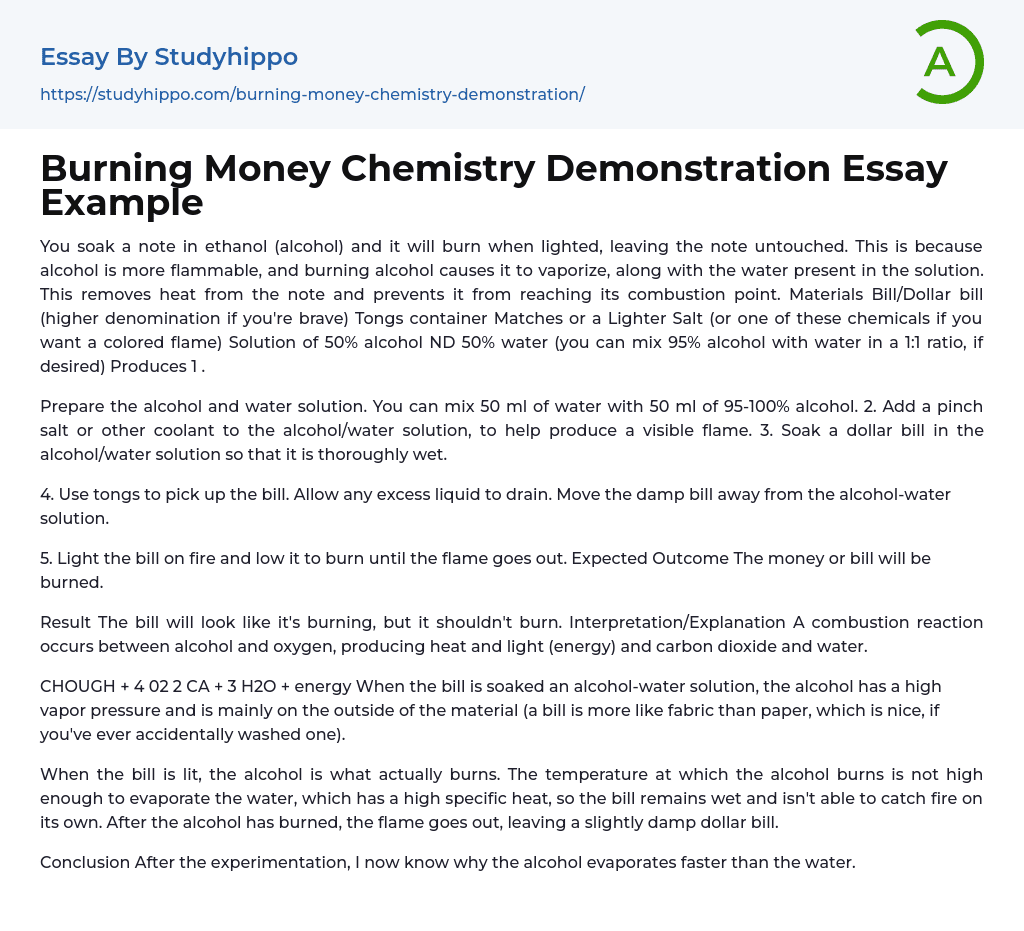You soak a note in ethanol (alcohol) and it will burn when lighted, leaving the note untouched. This is because alcohol is more flammable, and burning alcohol causes it to vaporize, along with the water present in the solution. This removes heat from the note and prevents it from reaching its combustion point. Materials Bill/Dollar bill (higher denomination if you're brave) Tongs container Matches or a Lighter Salt (or one of these chemicals if you want a colored flame) Solution of 50% alcohol ND 50% water (you can mix 95% alcohol with water in a 1:1 ratio, if desired) Produces 1 .
Prepare the alcohol and water solution. You can mix 50 ml of water with 50 ml of 95-100% alcohol. 2. Add a pinch salt or other coolant to the alcohol/water solution, to hel
...p produce a visible flame. 3. Soak a dollar bill in the alcohol/water solution so that it is thoroughly wet.
4. Use tongs to pick up the bill. Allow any excess liquid to drain. Move the damp bill away from the alcohol-water solution.
5. Light the bill on fire and low it to burn until the flame goes out. Expected Outcome The money or bill will be burned.
Result The bill will look like it's burning, but it shouldn't burn. Interpretation/Explanation A combustion reaction occurs between alcohol and oxygen, producing heat and light (energy) and carbon dioxide and water.
CHOUGH + 4 02 2 CA + 3 H2O + energy When the bill is soaked an alcohol-water solution, the alcohol has a high vapor pressure and is mainly on the outside of the material (a bill is more like fabric
than paper, which is nice, if you've ever accidentally washed one).
When the bill is lit, the alcohol is what actually burns. The temperature at which the alcohol burns is not high enough to evaporate the water, which has a high specific heat, so the bill remains wet and isn't able to catch fire on its own. After the alcohol has burned, the flame goes out, leaving a slightly damp dollar bill.
Conclusion After the experimentation, I now know why the alcohol evaporates faster than the water.
- Bottled Water essays
- Acid essays
- Calcium essays
- Carbohydrate essays
- Carbon essays
- Chemical Bond essays
- Chemical Reaction essays
- Chemical reactions essays
- Chromatography essays
- Concentration essays
- Copper essays
- Diffusion essays
- Ethanol essays
- Hydrogen essays
- Organic Chemistry essays
- Osmosis essays
- Periodic Table essays
- Ph essays
- Salt essays
- Sodium essays
- Titration essays
- Bank essays
- Banking essays
- Corporate Finance essays
- Credit Card essays
- Currency essays
- Debt essays
- Donation essays
- Enron Scandal essays
- Equity essays
- Financial Accounting essays
- Financial Crisis essays
- Financial News essays
- Financial Ratios essays
- Financial Services essays
- Forecasting essays
- Foreign Exchange Market essays
- Free Market essays
- Gold essays
- Investment essays
- Legacy essays
- Loan essays
- Market Segmentation essays
- Money essays
- Personal finance essays
- Purchasing essays
- Retirement essays
- Shareholder essays
- Stock Market essays
- Supply And Demand essays




